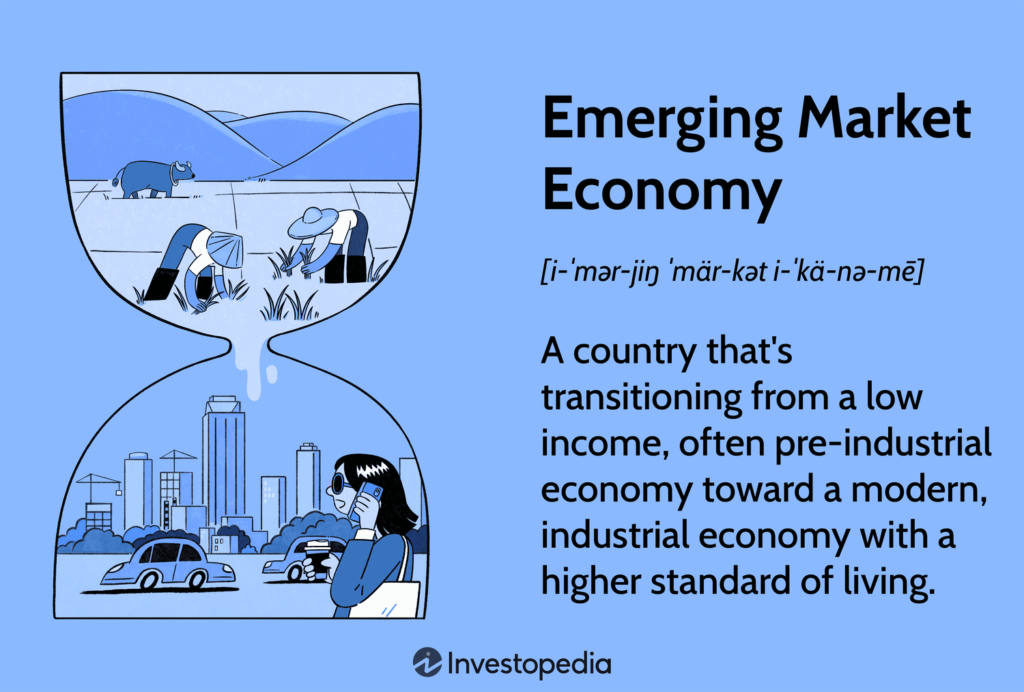To identify and invest in emerging markets, research economic indicators and analyze political stability. Assess market potential and risks for informed decisions.
Emerging markets offer lucrative investment opportunities due to their rapid economic growth and expanding consumer base. Investors should focus on key economic indicators such as GDP growth, inflation rates, and foreign direct investment. Political stability is crucial, as it affects market reliability and potential returns.
Thoroughly understanding the market’s legal and regulatory framework can minimize risks. Diversification is essential to mitigate potential losses. By staying informed and conducting comprehensive research, investors can capitalize on the high returns that emerging markets often provide. This strategic approach ensures a balanced portfolio and maximizes growth potential.

Credit: www.ft.com
Introduction To Emerging Markets
Emerging markets offer exciting opportunities for investors. These markets are growing fast and can provide high returns. Understanding these markets is key to making wise investments.
What Are Emerging Markets?
Emerging markets are countries that are developing quickly. They are not yet as advanced as developed nations. These countries are improving their economic systems.
Some examples of emerging markets include:
- China
- India
- Brazil
- South Africa
These countries show strong potential for economic growth. They offer new opportunities for investors.
Importance Of Emerging Markets
Investing in emerging markets can be very beneficial. Here are some reasons why:
- High Growth Potential: These markets often grow faster than developed markets.
- Diversification: Investing in these markets can diversify your portfolio.
- New Opportunities: Emerging markets offer new and unique investment opportunities.
Let’s look at a comparison table:
| Aspect | Emerging Markets | Developed Markets |
|---|---|---|
| Growth Rate | High | Moderate |
| Risk Level | Higher | Lower |
| Investment Opportunities | New and Unique | Established |
Understanding the importance of emerging markets can help you make better investment choices.

Key Characteristics
Understanding the key characteristics of emerging markets is crucial for investors. These markets offer high growth potential but come with risks. Below are some essential factors to consider.
Economic Indicators
Economic indicators provide valuable insights into the health of an emerging market. Look for these key metrics:
- Gross Domestic Product (GDP): High GDP growth rates signal a thriving economy.
- Inflation Rate: Low and stable inflation is a good sign.
- Unemployment Rate: Lower unemployment rates indicate a robust job market.
These indicators help you gauge the economic stability and growth potential. A healthy economy often means better investment returns.
Political Landscape
The political environment plays a significant role in emerging markets. Stable governments are crucial for economic growth. Consider the following aspects:
- Government Stability: Frequent changes can lead to market instability.
- Regulatory Environment: Favorable policies attract foreign investments.
- Corruption Levels: High corruption can deter investment and growth.
Understanding the political landscape helps in assessing the risks associated with investments in these markets.
Market Volatility
Emerging markets are known for their volatility. This can be both an opportunity and a risk:
- High Volatility: Offers the potential for high returns but also high risks.
- Currency Fluctuations: Can impact investment returns, especially in foreign currencies.
Investors should be prepared for market fluctuations. A diversified portfolio can help mitigate some of these risks.
Researching Emerging Markets
Researching emerging markets is crucial for successful investments. Understanding these markets helps you make informed decisions. Here are some essential steps to follow.
Reliable Sources
Use reliable sources to gather information on emerging markets. Trusted websites, financial news, and government reports are good places to start.
- World Bank – Offers economic data and country profiles.
- International Monetary Fund (IMF) – Provides global economic analysis.
- Bloomberg – Delivers financial news and market data.
Analyzing Data
Analyze data to understand market trends. Look for key indicators like GDP growth, inflation rates, and political stability.
| Indicator | Importance | Source |
|---|---|---|
| GDP Growth | High | World Bank |
| Inflation Rates | Medium | IMF |
| Political Stability | High | Local News |
Consulting Experts
Consult experts to get professional advice. Financial advisors and market analysts offer valuable insights.
- Find a reputable financial advisor.
- Attend seminars and webinars.
- Read expert opinions in financial journals.
Consulting experts can help you make better investment choices.
Identifying Opportunities
Emerging markets can offer high returns. But identifying the right opportunities is key. Investors need to focus on high-growth sectors, promising companies, and government initiatives. This approach can help in making informed investment decisions.
High-growth Sectors
High-growth sectors drive economic development in emerging markets. Sectors like technology, healthcare, and renewable energy often show rapid growth. These sectors usually benefit from increased demand and innovation.
For example, the technology sector in India has grown significantly. It offers vast opportunities for investors. Similarly, renewable energy in Brazil is expanding rapidly. Identifying these sectors can lead to lucrative investments.
Promising Companies
Identifying promising companies is crucial for successful investments. Look for companies with strong financial health and growth potential. These companies often lead in their respective sectors.
Consider companies with robust business models and competitive advantages. For instance, a leading telecom company in Africa could be a good investment. Such companies often have a large market share and strong revenue growth.
Government Initiatives
Government initiatives play a vital role in emerging markets. Favorable policies and reforms can boost economic growth. Investors should pay attention to these initiatives.
For instance, China’s Belt and Road Initiative has created numerous opportunities. Similarly, India’s “Make in India” campaign supports manufacturing growth. Understanding these initiatives can help identify lucrative investment opportunities.
| Country | High-Growth Sector | Promising Company | Government Initiative |
|---|---|---|---|
| India | Technology | Infosys | Make in India |
| Brazil | Renewable Energy | Petrobras | Energy Reforms |
| China | Manufacturing | Huawei | Belt and Road |
Investing in emerging markets requires careful analysis. Focus on high-growth sectors, promising companies, and government initiatives. This strategy can help maximize returns and minimize risks.
Investment Strategies
Investing in emerging markets can be very rewarding. It’s crucial to have a solid strategy. This section will cover three key strategies: Diversification, Risk Management, and Long-term vs Short-term. These strategies will help you make informed decisions.
Diversification
Diversification is key to reducing risk. Spread your investments across various assets. This could include stocks, bonds, and commodities. A diversified portfolio can help you handle market volatility. Here’s a simple table to show how you can diversify:
| Asset Type | Percentage |
|---|---|
| Stocks | 50% |
| Bonds | 30% |
| Commodities | 20% |
Ensure your assets are in different sectors. This further reduces risk.
Risk Management
Risk management is crucial in emerging markets. Be aware of political and economic risks. Use stop-loss orders to limit potential losses. You can also invest in mutual funds or ETFs. These funds often have built-in risk management.
Consider these tips:
- Set a clear budget for investments.
- Keep an emergency fund separate.
- Regularly review your portfolio.
Long-term Vs Short-term
Decide if you want to invest long-term or short-term. Long-term investments can benefit from market growth. Short-term investments might offer quick returns but come with higher risk.
Here are some points to consider:
- Long-term: Suitable for retirement plans, better for market fluctuations.
- Short-term: Suitable for quick gains, higher risk, and requires active management.
Balancing both strategies can be a good approach.
Financial Instruments
Investing in emerging markets can be highly rewarding. Understanding the different financial instruments available is crucial. This section explores various options to help you make informed decisions.
Stocks And Bonds
Stocks represent ownership in a company. They offer high potential returns but come with high risk. Emerging markets often have promising companies with high growth potential.
Bonds are loans made to entities such as governments. They provide regular interest payments and are less risky than stocks. Emerging market bonds can offer higher yields compared to developed markets.
Mutual Funds
Mutual funds pool money from many investors to buy a variety of securities. They offer diversification, reducing risk. Emerging market mutual funds focus on stocks and bonds from developing countries. This allows investors to gain exposure to multiple markets.
Etfs
Exchange-Traded Funds (ETFs) are similar to mutual funds but trade like stocks. They offer flexibility and lower costs. Emerging market ETFs track indexes of specific regions or sectors. This provides a simple way to invest in a broad range of assets.
| Instrument | Risk Level | Potential Returns |
|---|---|---|
| Stocks | High | High |
| Bonds | Low | Moderate |
| Mutual Funds | Moderate | Varies |
| ETFs | Moderate | Varies |
- Stocks: High risk, high returns, ownership in companies
- Bonds: Low risk, regular interest, loans to entities
- Mutual Funds: Diversified, moderate risk, pooled investments
- ETFs: Flexible, lower costs, trades like stocks
Risks And Challenges
Investing in emerging markets can be exciting, yet it comes with risks. Knowing these risks helps in making better decisions. Here are some key challenges to consider.
Market Instability
Emerging markets often face significant market instability. This can be due to political changes or economic shifts. Investors might see sudden drops in stock prices.
For example, a change in government policies can affect market performance. It is essential to stay informed about political events. An unstable market can lead to unpredictable returns.
Currency Fluctuations
Currency fluctuations are another big challenge. The value of local currency can change rapidly. This can impact the value of your investments.
Consider this: An investor buys stocks in a foreign currency. If that currency weakens, the investment’s value decreases. Even if the stock price remains the same.
| Scenario | Impact |
|---|---|
| Local currency strengthens | Investment value increases |
| Local currency weakens | Investment value decreases |
Regulatory Issues
Regulatory issues can pose significant risks. Different countries have different regulations. These can affect how businesses operate.
For instance, a country might change its tax laws. This can impact company profits and, in turn, your investment returns. Staying updated on regulatory changes is crucial.
Key Takeaways:
- Understand the political landscape to gauge market stability.
- Monitor currency trends to manage currency risks.
- Stay informed about regulatory changes in the market.

Credit: www.linkedin.com
Tips For Beginners
Identifying and investing in emerging markets can be a rewarding journey. For beginners, it can seem daunting. But with the right strategies, you can navigate this landscape successfully. Let’s explore some essential tips to get you started.
Starting Small
Begin your investment journey with a small amount. This helps you learn without taking big risks. Small investments allow you to observe market trends. You can adjust your strategies as you gain experience.
Consider using a diversified approach. Spread your investments across different sectors. This reduces the risk of loss. Start with what you can afford to lose. As you gain confidence, you can increase your investment.
Continuous Learning
Learning is key to successful investing. Stay updated with global market trends. Read financial news and reports. Join investment forums and groups. This helps you understand market dynamics better.
Attend webinars and workshops on emerging markets. These events provide valuable insights. Follow experienced investors and learn from their strategies. Continuous learning helps you make informed decisions.
Seeking Professional Advice
Professional advice can be invaluable. Financial advisors can guide you. They have expertise in market analysis. This can help you make better investment choices.
Look for advisors with experience in emerging markets. Their insights can save you from potential pitfalls. Consider consulting with a financial advisor before making significant investments. This ensures you have a solid investment plan.
Success Stories
Emerging markets offer exciting opportunities for investors. Identifying and investing in these markets can lead to significant returns. Let’s explore some success stories that highlight the potential of emerging markets.
Case Studies
Brazil’s Tech Boom: Brazil’s technology sector has seen rapid growth. Companies like Nubank have revolutionized banking. Nubank started as a small fintech company. Now, it serves millions of customers. Early investors saw huge returns.
India’s E-commerce Surge: India’s e-commerce market has exploded. Companies like Flipkart and Paytm have led this growth. Flipkart, launched in 2007, became a market leader. Walmart acquired Flipkart for $16 billion in 2018. Early stakeholders made substantial profits.
China’s Renewable Energy Growth: China invested heavily in renewable energy. Companies like BYD and JinkoSolar have thrived. BYD started as a battery manufacturer. It now leads in electric vehicles. JinkoSolar became a top solar panel producer. Investors in these companies saw notable gains.
Lessons Learned
- Research: Always research emerging markets thoroughly.
- Diversification: Spread your investments across various sectors.
- Local Expertise: Work with local experts for better insights.
- Risk Management: Be prepared for market volatility.
Future Outlook
The future of emerging markets looks promising. Countries in Africa show potential. Nigeria and Kenya are becoming tech hubs. Southeast Asia is also emerging. Indonesia and Vietnam are growing rapidly.
Investing in these markets now could yield significant returns. Keep an eye on technological advancements. Renewable energy and digital finance are key sectors. Stay informed and ready to seize new opportunities.

Credit: www.vaneck.com
Frequently Asked Questions
What Is The Best Way To Invest In Emerging Markets?
Diversify investments across multiple emerging markets. Use ETFs or mutual funds for broad exposure. Research thoroughly before investing.
How Do You Determine Emerging Markets?
We determine emerging markets by analyzing economic growth, political stability, market size, and investment opportunities. Key indicators include GDP growth rate, inflation, and foreign investment. Monitoring these factors helps identify promising markets.
How To Invest In Emerging Industries?
Research market trends and identify high-growth sectors. Diversify your portfolio to minimize risk. Invest in industry-specific ETFs or mutual funds. Monitor industry news regularly. Consult financial advisors for expert guidance.
How Much Should I Invest In Emerging Markets?
Invest 5-10% of your portfolio in emerging markets. Assess your risk tolerance and diversify to minimize potential losses.
Conclusion
Identifying and investing in emerging markets can offer significant growth opportunities. Stay informed, diversify, and assess risks carefully. Building a well-researched strategy can lead to successful investments. Keep learning and adapting to market changes for sustained success. This approach can help you maximize returns and secure your financial future.

Olga L. Weaver is a distinguished figure in both the realms of real estate and business, embodying a unique blend of expertise in these interconnected domains. With a comprehensive background in real estate development and a strategic understanding of business operations, Olga L. Weaver has positioned herself as a trusted advisor in the complex intersection of property and commerce. Her career is marked by successful ventures in real estate, coupled with a keen ability to integrate sound business principles into property investments. Whether navigating the intricacies of commercial transactions, optimizing property portfolios, or providing strategic insights into market trends, Olga L. Weaver’s expertise encompasses a wide spectrum of both real estate and business-related topics. As a dual expert in real estate and business, she stands as a guiding force, empowering individuals and organizations with the knowledge and strategies needed to thrive in these intertwined landscapes. Olga L. Weaver’s contributions continue to shape the dialogue around the synergy between real estate and business, making her a respected authority in both fields.
